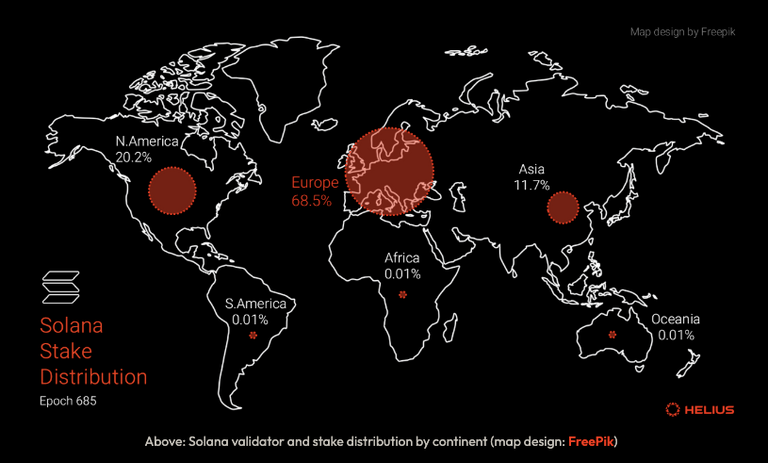In the ever-evolving world of blockchain technology, decentralization remains a cornerstone principle. Solana, often criticized for perceived centralization, has been making significant strides in this area. Let's unpack the current state of Solana's decentralization efforts and what it means for the network's future.
The Backbone of Solana's Network
Solana's ecosystem is more robust than many realize. With 4,514 nodes, including 1,414 validators and 3,100 RPCs, the network showcases impressive distribution. What's particularly noteworthy is that no single validator controls more than 3.2% of the total stake, a testament to the network's efforts to prevent centralization of power.
Stake Distribution: A Closer Look
The network's stake distribution paints an interesting picture:
- 82 validators (5.87% of the total) hold over one million delegated SOL
- 825 validators (59.1% of the total) have under 50,000 delegated SOL
This distribution suggests a healthy mix of large and small players in the ecosystem. The Solana Foundation Delegation Program (SFDP) plays a crucial role here, supporting about 72% of Solana validators and representing 19% of the total stake.
Geographical Diversity: A Global Network
Solana's global footprint is impressive, spanning 37 countries and territories. This geographical spread is crucial for network resilience:
- Europe leads with 46% of validators and 68% of stake
- North America follows with 40% of validators and 20% of stake
- 50.5% of stake is within the European Union
While this shows good diversity, there's room for expansion, particularly in the global South. The network's presence across 121 cities worldwide further underscores its decentralized nature.

The Nakamoto Coefficient: A Measure of Decentralization
Solana's Nakamoto Coefficient, currently at 19, has remained relatively stable over the past year. While this puts Solana in the middle range compared to peer networks, it's important to note that the true coefficient might be lower due to entities operating multiple validators anonymously.
Hosting Provider Diversity: Lessons Learned
The network spans 135 different hosting providers, a diversity that proved crucial during the 2022 Hetzner incident. When Hetzner unexpectedly removed Solana validators, taking about 20% of the active stake offline, the network remained operational. This resilience showcased Solana's ability to withstand significant infrastructure challenges.
Client Diversity: A Work in Progress
Solana is making strides in client diversity:
- The Agave client codebase boasts 357 individual contributors
- The Firedancer client, still in development, has 57 contributors
- The Jito client currently dominates with 88% of the network's stake
While the Jito client's dominance is a point of concern, the introduction of Firedancer over the next year is expected to significantly alter this landscape.
Governance and Development: A Community Effort
Solana's governance process, including the formal SIMD proposal process and governance votes for significant changes, demonstrates a commitment to community-driven decision-making. The Solana Foundation, with its lean team of 60-65 full-time employees, oversees crucial aspects of ecosystem growth.
The Developer Ecosystem: A Global Community
The vibrancy of Solana's developer community is evident in its hackathons and initiatives:
- The recent Radar hackathon drew 13,672 participants from 156 countries
- SuperTeam, a network of Solana creatives and developers, has expanded to 1,300 members across 16 countries
Looking Ahead: Challenges and Opportunities
While Solana has made significant progress, challenges remain:
- Improving geographical distribution, especially in underrepresented regions
- Enhancing client diversity to reduce reliance on a single implementation
- Continuing to balance stake distribution to prevent centralization of power
A Network in Evolution
Solana's journey towards decentralization is ongoing and promising. The network has demonstrated resilience, global reach, and a commitment to community-driven growth. For investors and enthusiasts, these developments signal a maturing ecosystem that's addressing critical concerns head-on.
As Solana continues to evolve, keeping an eye on these decentralization metrics will be crucial. The network's ability to balance growth with decentralization will likely play a significant role in its long-term success and adoption in the broader blockchain landscape.
¡Queremos leerte!
Entra y publica tus artículos con nosotros.
Vota por el witness @cosmicboy123